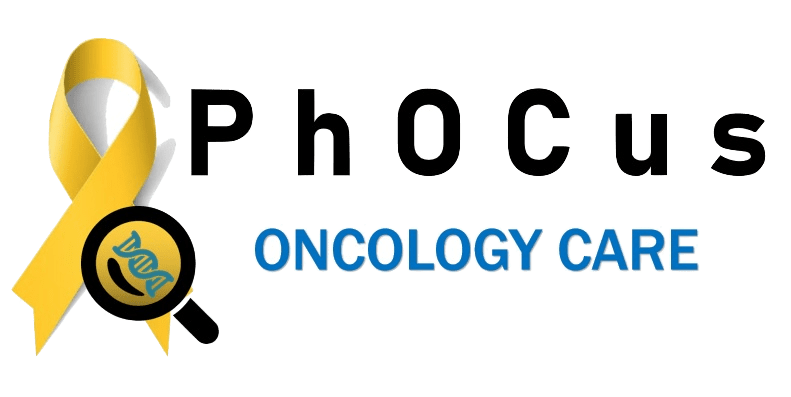PhOCus Trial
Over 650,000 patients per year are treated with chemotherapy, with the majority reporting side effects. The goal of the PhOCus Trial is to determine whether delivering pharmacogenomic results to oncology providers will help reduce incidence of severe chemotherapy related side effects and toxicities.

Pharmacogenomics
What is Pharmacogenomics?
Pharmacogenomics is the study of how genetic variants affect individual response to medications, and has promise to personalize chemotherapy drug dosing to maximize efficacy and safety in oncology patients. It is part of the field of precision medicine, which aims to treat each patient individually.
Oncology Care
Why testing?
Chemotherapies such as fluoropyrimidines and irinotecan have well-known pharmacogenomic associations, and preemptive pharmacogenomic testing prior to treatment offers the potential to identify patients at increased risk for toxicities. The implementation of Pharmacogenomic Testing in Oncology Care is a project whose goal is to provide personalized chemotherapy dosing in oncology patients, which we hypothesize will result in improved treatment tolerability as well as outcomes for cancer patients.
Accessing the Importance of Pharmaco-genomics Intervention in Onco-Care.
PHOcUS Trial evaluates the role of pharmacogenomics testing in cancer care. By utilizing the frontier web portal Genome Prescribing System (GPS), this study provides patient-specific dosing guidance in chemotherapy. With drugs at a specific dosage tailored to each patient’s genetic profile, PhOCus Trial is at the front end of revolutionize precision healthcare.
Pharmacogenomics Group
In the pharmacogenomic arm, providers will be given immediate access to patient-specific information and genotypic dosing guidance in the form of the electronic medical record integrated software tool, the Genomic Prescribing System (GPS).
Control Group
In the control arm, initial fluoropyrimidine and irinotecan dosing will occur per standard of care, and patient genotyping will occur 6 months after enrollment, or at the time of a chemotherapy related adverse event.
Genotypes
GPS: Pharmacogenomics Web Portal
Patients’ genotyping results will be delivered to providers through our online web portal, the Genomic Prescribing System (GPS), which provides point of care pharmacogenomic information, dosing recommendations, and literature references to help guide personalized prescribing.
Genome Prescribing System (GPS)
The PhOCus Trial: Implementation of Pharmacogenomic Testing in Oncology Care
Doctors leading this study hope to find out if giving study participants’ genetic information to cancer care providers will help personalize chemotherapy dosing decisions and decrease common chemotherapy side effects. Doctors leading the study will collect genetic information from study participants using pharmacogenomics/genotyping.

Publication
Focus, Accuracy, Efficacy
The PhOCus Trial focuses on how the differences in our genes can affect our unique response to medications.
The two primary endpoints are 1) the dose intensity deviation rate during the 1st treatment cycle (the proportion of patients receiving chemotherapy dosing modifications), and 2) the incidence of severe medication-related toxicities throughout the entire treatment course. Secondary endpoints will include chemotherapy dose intensity and progression-free survival. Exploratory endpoints will include the impact on prescribing of additional oncology related and supportive care medications, as well as patient-reported quality of life and patient understanding of pharmacogenomics.
Read Publication
PhOCus Trial Recruitment
Oncology Care Tailored to Your Genetic Profile
Enroll in the PhOCus Trial today and receive cancer treatment tailored to your genetic profile. Adult oncology patients receiving care at the University of Chicago Medical Center, and for whom treatment with fluoropyrimidine and/or irinotecan therapy is being considered are eligible for PHOcUS Trial.
Project Leaders
The PhOCus trial is led by principal investigator Dr. Peter H O’Donnell as well as clinical pharmacology fellow Dr. Natalie Reizine.

Dr. Peter O’Donnell
Principle investigator
Associate Professor of Medicine, Section of Hematology/Oncology; Chair, Committee on Clinical Pharmacology and Pharmacogenomics; Deputy Director, Center for Personalized Therapeutics, The University of Chicago

Dr. Natalie Reizine
Clinical Pharmacology Fellow
Clinical Pharmacology Fellow, 2021; Assistant Professor, Department of Internal Medicine, College of Medicine, University of Illinois at Chicago
Cancer is relentless, so are we.
cpt1200@uchicago.edu
Phone
(773)-753-1200
Open Hours
Mon – Fri: 9:00AM – 16:00PM
Address
5841 South Maryland Avenue MC 2115



